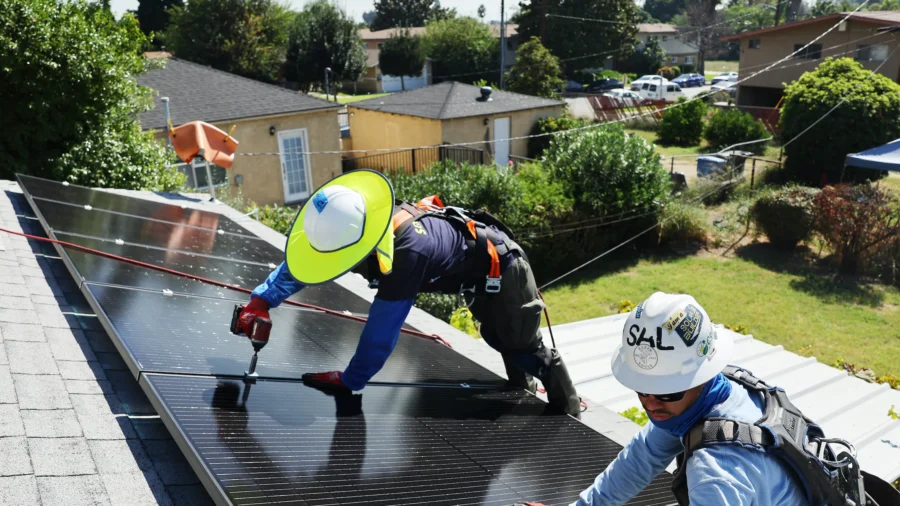A Houston-based solar panel company recently granted a $3 billion loan from the federal government has been accused of using dubious sales practices targeting elderly people.
Solar panel company Sunnova has gone door to door and sold five-figure contracts to many dementia sufferers, said the Washington Free Beacon in a report based on interviews and state consumer complaint records.
The contracts could span decades, and the subsequent financial burden was handed down to the elderly people’s children after they passed away in several cases, the report said.
Terry Blythe, a Texan, told the Washington Free Beacon that her 86-year-old father had dementia, but a door-to-door Sunnova salesman persuaded him to sign a 25-year solar panel lease contract in 2020. Her father passed away in 2023, and Ms. Blythe was left with a $34,000 contract.
“It was truly ripping off old people,” she said. “It was the biggest ripoff I’ve ever seen.”
Ms. Blythe said she had to sell her parent’s house at a lower price because buyers did not want to shoulder the solar contract. She said she needed to sell the house, which is in a low-end neighborhood, to help her pay for her mother’s assisted living care.
“If I can’t recoup the money my mom needs, at least maybe I can help others that they might scam,” she said. “The fact that they were just awarded that much money from the government is sickening,” she said concerning a recent $3.0 billion partial loan guarantee agreement made with the Department of Energy (DOE).
Complaints to Texas AG
Ms. Blythe and more than 50 other people filed complaints to the Texas Attorney General’s Office over Sunnova’s allegedly predatory sales tactics and other issues, such as maintenance delays, the Washington Free Beacon reported.
In another example, Mary Loller’s elderly father was given just months to live when a door-to-door Sunnova salesman persuaded him to buy a $60,000 solar system for his mobile house last year.
“My dad told [the salesman] at that time he was on hospice and dying. And basically, he wasn’t in his right mind,” said Ms. Loller.
Her father passed away soon after. Ms. Loller said Sunnova placed a lien on the mobile house, which prevented her from selling the property.
Ms. Blythe and Ms. Loller said they contacted Sunnova about the troubling sales practices, but the company has not resolved the issues.
In a similar complaint seen by the Washington Free Beacon, a Harris County, Texas woman said her 80-year-old mother was “blind, bed bound, partially deaf, on dialysis, with congestive heart failure” when Sunnova sold the elderly woman a 25-year, $86,000 contract. The mother died three months later.
“Sunnova used predatory lending tactics and fraud to execute a 25 year contract on an elderly woman that was dying, and would never live 25 years to pay off a contract of this magnitude,” the complaint read.
DOE Energy Loan
The DOE, through its Loan Programs Office (LPO), awarded Sunnova with a $3 billion loan to expand Sunnova’s services to “underserved American communities,” according to a company’s press release on Sept. 23.
According to the release, Sunnova will use the loan money to, in turn, give loans to people of lower-income communities so they can pay their solar contracts.
“Today marks the beginning of an exciting chapter in our pursuit of a cleaner and more equitable energy landscape. With our collaboration with the U.S. Department of Energy, we are embarking on a journey that expands clean energy access and delivers economic benefit to Americans in disadvantaged communities,” said William J. (John) Berger, Chief Executive Officer of Sunnova Energy.
“This partnership reflects our commitment to innovation with purpose.”
Conflict of Interest?
However, the arrangement has raised concerns over a possible conflict of interest between the company and DOE’s Loan Programs Office (LPO).
Sen. John Barrasso (R.-Wyo.), a ranking member of the Senate Energy and Natural Resources Committee, has sent a letter to DOE Ethics Agency’s Susan Beard regarding a potential conflict of interest with the LPO giving funding to Sunnova.
In the letter, Mr. Barrasso expresses his concerns regarding Jigar Shah, a director at LPO. He said that Mr. Shah had founded and led a trade association called Cleantech Leaders Roundtable, which shares a board member with Sunnova.
The board member in question, Anne Slaughter Andrew, is the spouse of the former Chair of the Democratic National Committee, Joe Andrew.
“Such intertwining of personal, political, and professional relationships raises further questions about the impartiality of loan approvals and the susceptibility of the process to undue political influence,” the letter states.
“The potential for conflicts of interest, especially in light of a $3 billion loan approval for Sunnova, a company who shares a board member with Cleantech Leaders Roundtable, cannot be overlooked,” said Mr. Barrasso.
Sunnova and the DOE did not respond to a request for comment.

